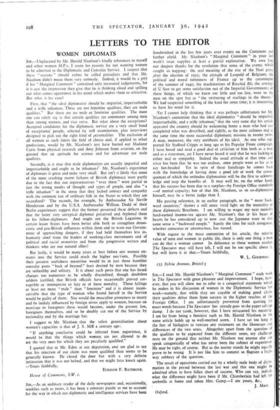LETTERS TO THE EDITOR
WOMEN DIPLOMATS Stu,—Unplacated by Mr. Harold Nicolson's kindly references to myself and other-women M.P.s, I scorn his reasons for not wanting women to be admitted to the Diplomatic and Consular Service. I suspect that these " reasons " should rather be called prejudices and that Mr. Nicolson didn't mean them very seriously. Indeed, it would be a pity if his " Marginal Comment " contained only measured judgements, for it is just the impression they give that he is thinking aloud and spilling out what comes uppermost in his mind which makes them so attractive. But what is his case?
First, that " the ideal diplomatist should be impartial, imperturbable and a trifle inhuman. These are not feminine qualities, they are male qualities." But there are no male or' feminine qualities. The most one can safely say is that certain qualities are commoner among men than among women, and vice versa. But what about the exceptions? Accepted candidates for the diplomatic service are a very small band of exceptional people, selected by stiff examination, plus interviews designed to pick out the right kind of personalities The exclusion of all women as such limits the field of choice and, if applied to other professions, would by Mr. Nicolson's test have barred out Madame Curie from physical research and Amy Johnson from aviation, on the ground that an aptitude for science and for adventure are male qualities.
Secondly, is it true that male diplomatists are usually impartial and imperturbable and ought to. be inhuman? Mr. Nicolson's experience of diplomats is great and mine very small. But isn't It likely that some of the most crashing recent failures of British diplomacy were partly due to the fact that our representatives "over there" were partial to just the wrong modes of thought and types of people, and also " a trifle inhuman " in the sense that they lacked contact and sympathy with.the common run of ordinary folk in the States to which they are accredited? The records, for example, by Ambassador Sir Nevile Henderson and by the U.S.A. Ambassador William Dodd of their Berlin experiences suggest that the former possessed these defects and that the latter very untypical diplomat perceived and deplored them in his fellow-diplomats. And might not the British Legations in certain lesser States have been better able both to strengthen demo- cratic and pro-British influences within them and to warn our Govern- ment of approaching dangers, if they had held themselves less in- humanly aloof from the leaders of working-class movements and of political and racial minorities and from the progressive writers and . thinkers who are our natural allies?
But lastly, it would be many years at best before any women en- trants into the Service could reach the higher pos.tions. Possibly their greatest usefulness meantime would be in just those humbler consular posts " back of beyond " least desired by men because they are unhealthy and solitary. It is about such posts that one has heard charges too numerous to be wholly discredited, though doubtless seldom justified, that British officials have occasionally proved cor- ruptible or intemperate or lazy or of loose morality. Those failings at least are more " male " than " feminine" and it is almost incon- ceivable that the type of woman who found herself in the Service would be guilty of them. Nor would the masculine proneness to marry and be hnduly influenced by foreign wives apply to women, because on marriage to foreigners these would become, under the present law, foreigners themselves, and so be doubly cut out of the Service by nationality and by the marriage bar.
I suggest to Mr. Nicolson that the safest generalisation about women's capacities is that of J. S. Mill a century ago: " If anything conclusive could be inferred from experience, it would be that the things which women, are not allowed to do are the very ones for which they are peculiarly qualified."
I quoted that to Mr. Eden at our deputation, and am glad to say that his rejection of our claim was more qualified than seems to be generally known. He closed the door but with a very definite intimation that it was not bolted, and that we might later knock again. —Yours faithfully, House of Commons, S.W. r. ELEANOR F. RATHBONE.


























 Previous page
Previous page